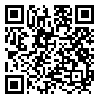Volume 4, Issue 1 (5-2023)
پژوهش های مابعدالطبیعی 2023, 4(1): 195-222 |
Back to browse issues page
Download citation:
BibTeX | RIS | EndNote | Medlars | ProCite | Reference Manager | RefWorks
Send citation to:



BibTeX | RIS | EndNote | Medlars | ProCite | Reference Manager | RefWorks
Send citation to:
Fathtaheri A, Mohammadi Moghanloei H. A Critical Exposition of the Concept of Hume’s Substance and Its Impact on Kant’s Theory of Knowledge. پژوهش های مابعدالطبیعی 2023; 4 (1) :195-222
URL: http://mi.khu.ac.ir/article-1-193-en.html
URL: http://mi.khu.ac.ir/article-1-193-en.html
1- Imam Khomeini International University
2- Imam Khomeini International University ,Hamid_nava@yahoo.com
2- Imam Khomeini International University ,
Abstract: (1604 Views)
In this article with a study of the meaning of substance in empirical philosophers’ viewpoints, we show that Hume's negation of substance has influenced Kant's theory of knowledge. To solve the problem of knowledge, Kant, on the one hand, turns the substance negated by Hume into a thing in itself. In this way, he tries to provide a strong foundation for the phenomena and keep his philosophy from falling into the abyss of absolute idealism. On the other hand, with the Copernican revolution, he turned the substance into one of the categories and determinations of the subject. In this way, he kept its essential role in the formation of knowledge and paved the way for the object to correspond with the mind. Therefore, in a sense, Kant preserves the substance in the meaning of the predecessors, but no epistemic role is possible for this meaning; however, he tries to maintain the epistemic position of the substance in another sense. The reason why Kant, while transforming the substance of the predecessors into a thing in itself, did not abandon the substance, but presented another definition of it, was to be able to explain perception. Because he needed a permanent thing, of course, a permanent thing that can be pointed to its position with the subject, not an unchanging existence that is unknown with the objects.
Type of Study: Original Article |
Subject:
Philosophy
References
1. دکارت، رنه (1390)، اصول فلسفه، ترجمه منوچهر صانعی دره بیدی، تهران، موسسة فرهنگی هنری و انتشارات بین المللی الهدی، چاپ دوم.
2. دلوز، ژیل (1386)، فلسفه نقادی کانت، ترجمه اصغر واعظی، تهران، نشر نی، چاپ اول.
3. کاپلستون، فردریک (1370)، تاریخ فلسفه از هابز تا هیوم، ترجمه امیر جلال الدین اعلم، تهران، انتشارات علمی و فرهنگی و سروش، چاپ دوم.
4. کاپلستون، فردریک (1375)، تاریخ فلسفه از ولف تا کانت، ترجمه اسماعیل سعادت و منوچهر بزرگمهر، تهران، انتشارات علمی و فرهنگی و انتشارات سروش، چاپ دوم.
5. کاپلستون، فردریک (1380)، تاریخ فلسفه از دکارت تا لایبنیتس، ترجمه غلامرضا اعوانی، انتشارات علمی و فرهنگی، سروش، چاپ اول.
6. کانت، ایمانوئل (1399)، نقد عقل محض، ترجمه بهروز نظری، ،تهران، انتشارات ققنوس، چاپ ششم.
7. هارتناک، یوستوس (1378)، نظریه معرفت در فلسفة کانت، ترجمه غلامعلی حداد عادل، تهران، انتشارات هرمس، چاپ اول.
8. هیوم، دیوید (1399)، رساله ای در باب طبیعت آدمی، ترجمه جلال پیکانی، تهران، انتشارات ققنوس، چاپ چهارم.
9. وال، ژان (1380)، بحث در مابعدالطبیعه، ترجمه یحیی مهدوی، تهران، انتشارات خوارزمی، چاپ دوم.
10. وود،آلن (1396)،کانت، ترجمه عقیل فولادی، تهران، انتشارات نگاه معاصر، چاپ یکم.
11. یوئینگ، ای سی (1399)، شرحی کوتاه بر نقد عقل محض کانت، ترجمه اسماعیل سعادتی خمسه، تهران، انتشارات هرمس، چاپ سوم.
12. Kemp Smith, Norman (1930), A Commentary to Kant's 'Critique of Pure Reason, Palgrave Macmillan.
13. Thomson, D. C. Yalden (1951), Hume: Theory of knowledge, Nelson LTD.
14. Hausman, David & Alan (1989), Hume's use of illicit, Hstudies vol.15, number1, April 1989, Cambridge University Library. [DOI:10.1353/hms.2011.0516]
15. Melnick, Arthur (1973), Kant's Analogies of Experience, Chicago: University of Chicago Press.
16. Guyer, Paul (2006), Kant, First published by Routledge, London. [DOI:10.4324/9780203966624]
17. Paton, H.J (1936), Kant's Metaphysic of Experience, Vol. 1, A commentary on the first half of the kritik der reinen vernunft, London, George Allen.
18. Norton, David Fate&Taylor, Jacqueline (2009), The Cambridge Companion to Hume, Second Edition, Cambridge University press. [DOI:10.1017/CCOL9780521859868]
19. Dicker, Georges (1998), Hum's epistemology and Metaphysics an introduction, Routledge, London, and New York.
20. Allison, Henry E (2008), Custom and Reason in Hume A Kantian Reading of the First Book of the Treatise, Oxford University. [DOI:10.1093/acprof:oso/9780199532889.001.0001]
21. Brewer, Cameron David (2013), Kant, Hume, and the Notion of Material Substance, M.A., University of Illinois at Chicago.
22. Coventry, Angela (2007), Hume: A Guide for the perplexed, New York.
23. Orr, James, M.A., D (1903), David Hume and His Influence on Philosophy and Theology, New York. Charles Scribner's Sons.
24. Descartes, Rene (2011), Principles of Philosophy, translated by Manoochehr Saneie darrebidi, Tehran, Alhoda press. (In Persian).
25. Kant, Immanuel (2020), critique of pure reason, translated by Behrooz Nazari, Tehran, Qoqnoos press. (In Persian).
26. Hume, David (2020), A Treatise of Human Nature, translated by Jalal Peykani, Tehran, Qoqnoos press. (In Persian).
27. Wahl, Jean (2001), Traite de Metaphysique, translated by Yahya Mahdavi, Tehran, Tehran, Kharazmi press. (In Persian).
28. Wood, Allen (2017), Kant, translate by Aghil fooladi, Tehran, Negahe moaser press. (In Persian).
29. Ewing, Alfred Cyrill (2020), A short commentary on Kant's Critique of pure reason, translated by Esmaeel Sa'adati Khamseh, Tehran, Hermes press. (In Persian)
Send email to the article author
| Rights and permissions | |
 |
This work is licensed under a Creative Commons Attribution-NonCommercial 4.0 International License. |









